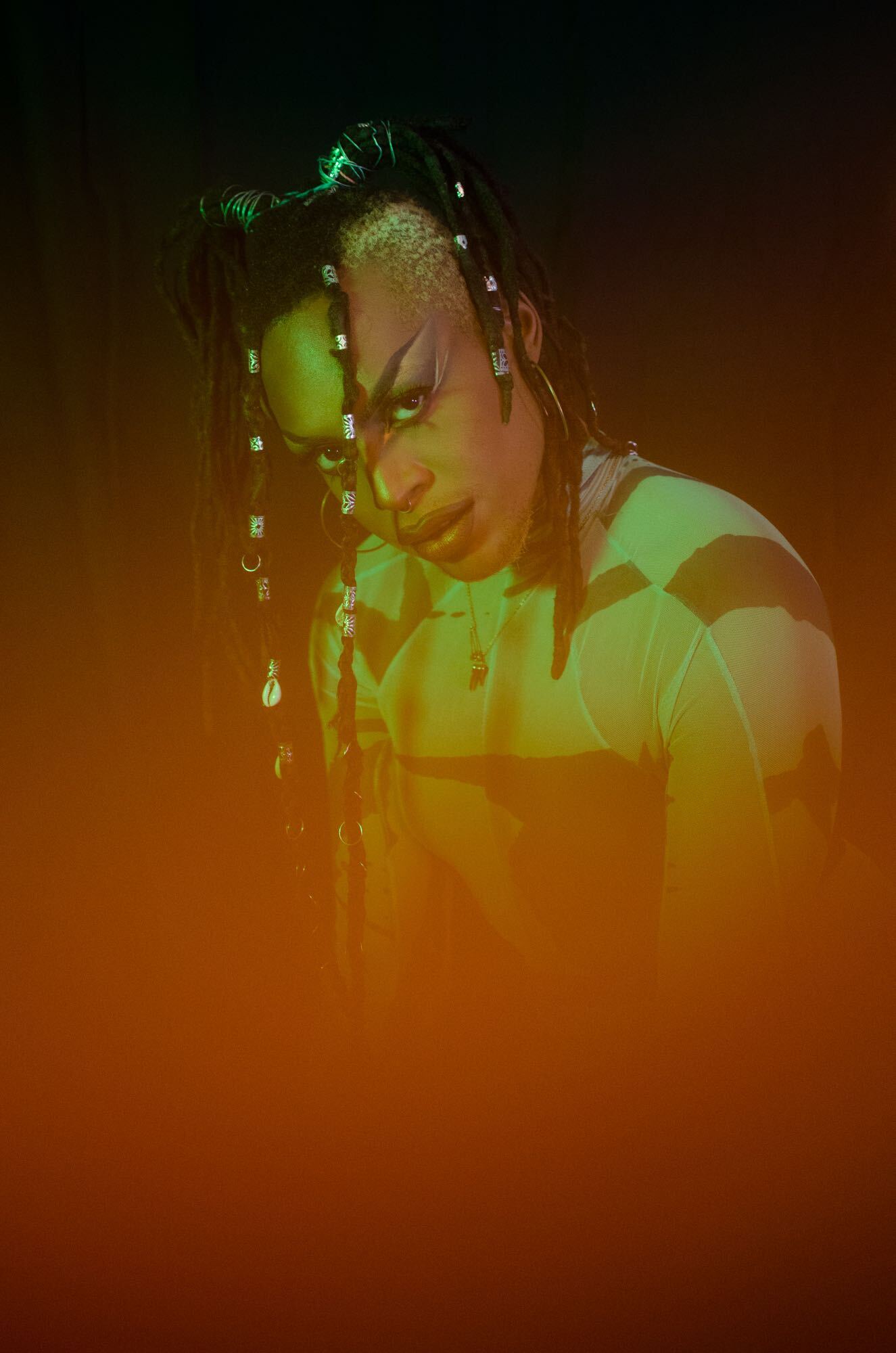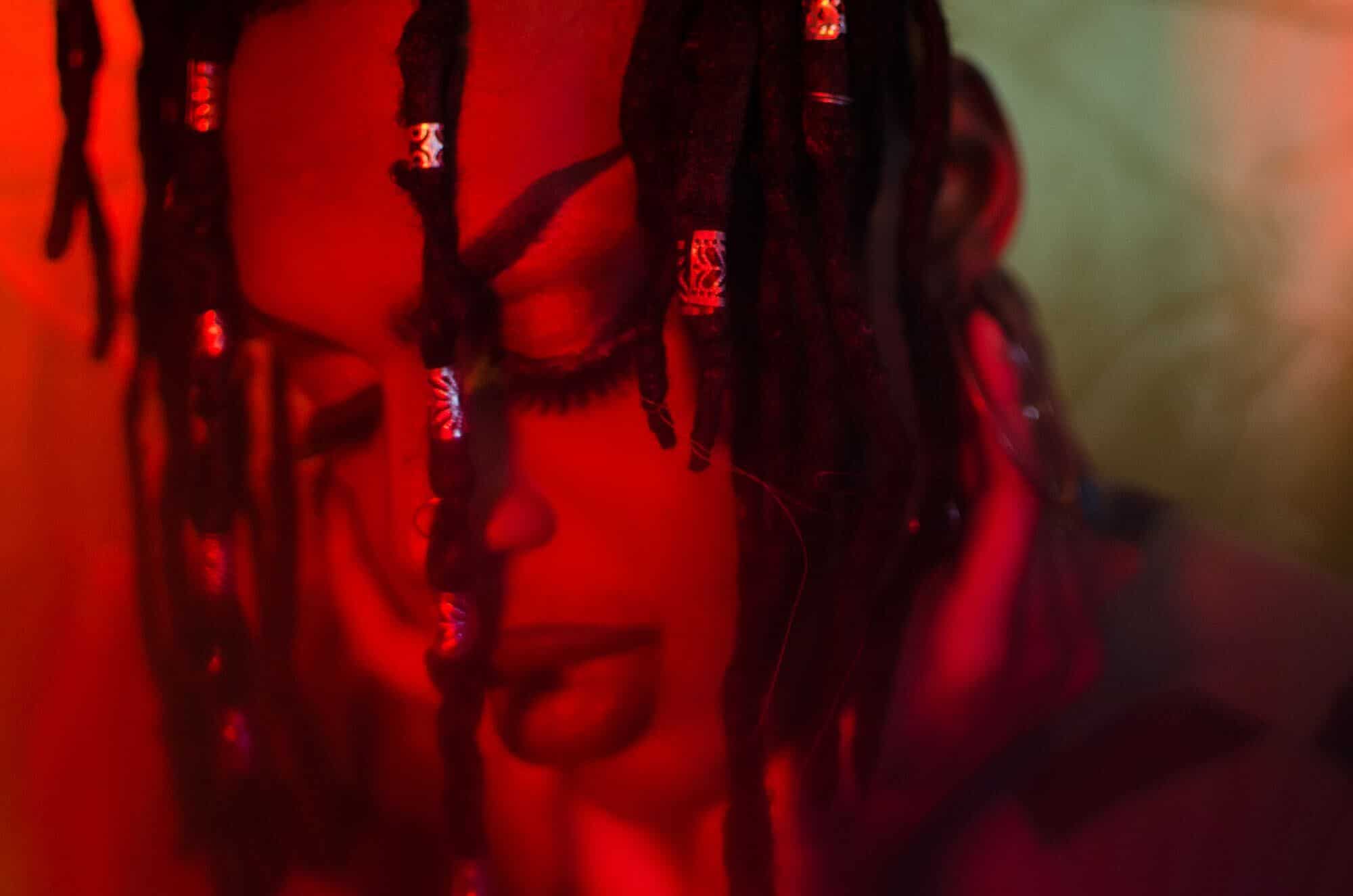mandhla.
By Janice Faith Heinrich
Art by Michelle Gutierrez
Musician, evolving, queer creative, performance artist, visual artist, Mandhla Ndubiwa a.k.a mandhla. is all those things – and more. Born and raised in Zimbabwe, she is now fully immersed in Berlin’s creative community. Her blend of experimental R&B and Soul speaks of her reality as a transfeminine, gender non-conforming body, which also reflects in her activism for queer and trans BIPoC. We met up with Mandhla to talk about her experiences as an artist, her passion for voguing and more.
Do you want to tell us a little bit about young Mandhla? What did you dream of back then? When did you start to get into singing and dancing?
Mandhla: I was a pretty inquisitive child. Always looking, always asking, always wondering. I grew up in Bulawayo, Zimbabwe, which is an incredibly picturesque environment with a vast amount of forestry, warm weather and these gigantic boulders, called the Matopos Hills, that stand on top of each other and tower over you like ancient ruins from our ancestors left as memories and reminders. I found joy in the beauty of my surroundings, social interactions, arts and music. I’m the last of three siblings, with the gap between me and my older brother being ten years. He identified as a conscious rapper when I was growing up and we spent a lot of time together. We spent hours listening and dissecting Public Enemy, Mobb Deep, Raekwon, NWA, Ice Cube and other lyricists together. With my father, I was listening to artists like Jimmy Dludlu, Caiphus Semenya, Letta Mbuli and other iconic South African musicians.
From a young age, I always wanted to make music. I wrote my first song when I was 9, and recorded my first track at 13. Singing and songwriting always came natural to me, but dancing was a bit different. I could never afford dance classes as a child and was uncomfortable with catering to ideas of masculinity or fitting into a binary. I always had a very feminine expression, in how I moved and the way my body swayed. Through my discovery of the ballroom scene, I finally had a space where I could explore my body and movement as a black trans* body. It gave me the confidence to incorporate more dancing into my art, even though I'm not technically trained.
When you work on new music or new pieces in general, what does that process look like?
Mandhla: Writing new music is always so exciting for me. I usually work around being inspired or being affected by a feeling or a deeply moving experience. It's hard to fake an emotion when writing for myself. Making music is such a cathartic exercise for me. It helps me contextualise my feelings in a way that validates them but also allows me to let go of them in a way.
When writing a song, I usually have an idea of what I would like to say. I've already got a few lines written or little melodies recorded on my phone. Then I start working on a beat or have a friend send one to me, so I can freestyle on it until I hear something I like. I take the best parts from that freestyle and build a concise idea, perspective and story. I work a lot on my lyrics and usually edit them afterwards to find the best rhyme patterns or phrases. Sometimes I also love to work on various multimedia projects and put them all together into a concise visual and audio journey. I always work in layers, building on top of things. Adding, editing and removing to create something that's truly honest.

You’re a performance artist who combines music, dancing, and visual art. How do you feel when you’re on stage? What does sharing yourself and your experiences with your audience feel like?
Mandhla: Performing is such an empowering act for me. It’s one of the only spaces in my life where I can control my narrative. I usually have full sets planned out and like to create a visual album, right in front of your eyes. I combine all these different elements because art, for me, has always been a full sensory experience.
It isn’t enough for me to just make music. I want to create experiences that combine music, dancing, social-political messages, and visual art. It’s incredibly important for me to tell my stories of love, acceptance, desire and existence but to also tell the stories of my sisters. We're currently in the worldwide genocide of Black trans* bodies, which has affected so many people that I love. It means a lot to me to share these stories, as it allows those people to live on longer than the way they left this earth or still exist. It allows me to honour and immortalise these incredible lives, as well as my own and combat the way the media turns us into statistics. My art is my protest but also my emancipation. It feels purposeful.
Last year you debuted as part of the Kiki House of Laveaux. How did that moment feel and where do you see yourself going with your house? What role has the Ballroom community played in your life so far?
Mandhla: It felt like an arrival. I’ve had a pretty tumultuous experience in the German ballroom scene, and have had a hard time finding a home. Ballroom is as much about house culture as it is about performing, and it felt like a big part of my life was missing. I saw peers get into houses before me, and grew a bit insecure, basing my lack of house requests on my talent and worth. I do believe in divine timing, and this timing did feel divine. I found such a wonderful house, with values that align with mine, and people I have everlasting bonds with. Ballroom has been a big part of my gender discovery, and in being able to comfortably push the depths of my femininity. It has helped so much with finding people like me. People who have gone through the same thing, whose joy and euphoria looks like mine. Ballroom has allowed me to look within myself and within society. It has completely changed my life.
You were a part of the short film “Octavia’s Visions” which is based on Octavia Butler’s life and writings. Do you have a favourite piece of writing by Octavia Butler? Has she ever inspired your own creative work?
Mandhla: Working on “Octavias Visions” was a dream. Octavia Butler has inspired so much of my work and how I tell stories through lyrics. I love noise production and I like to create this ether space that makes you feel like you’re floating around in an otherworldly galaxy of afro-futuristic thought. A space where the honesty of the stream of consciousness can exist. Octavia is so inspiring because they were able to create these stunning science fiction worlds while also tackling issues such as existence, race, gender, class, and choice. I love a lot of her writing, but lately, I've been re-reading the "Parable of the Sower" which has been pretty impactful in my experience as an immigrant.

Do you have any advice for people who want to pursue a career in the arts?
Mandhla: It’s incredibly important to keep yourself grounded. Be kind to yourself, and don’t rush your art. Take as much time as you want. From experience, I can say that it’s pivotal to create an environment that you can thrive in, whether mentally, emotionally or physically. If not you'll burnout, and there will be even less to give. But most of all, working smart and having the utmost belief in yourself and your gift is the best advice I can give.
What’s the best advice anyone has given you so far?
Mandhla: The best advice I have ever received is to remember to breathe, to trust in myself as much as possible and to never forget the people we have lost.
As a performance artist, student and activist you’re working a lot and especially with other people. How do you set boundaries and take space and time for yourself? What does rest and healing look like for you?
Mandhla: I’ve realised in the past few years that I’m not a machine, and I take self-preservation and setting boundaries very seriously. I haven’t been doing very well in that regard lately, but I do make active steps to try and quieten the noise sometimes. I meditate quite often, I love to cook. I make time to reflect, through nature, music and communicating with my ancestors. Being comfortable in being alone, and not feeling guilty for prioritising myself, has helped me to be able to find moments of calm. Also therapy. Lots of therapy.
You’ve already performed at lots of different festivals and parties. Do you have any favourite events or performances?
Mandhla: To date, it has to be my performance at the Pop-Kultur Festival in August of 2021. It was an hour-long performance conceptualised by myself and 10 other Black creatives in Berlin and Cologne. They all happen to be very close friends of mine who've helped me for the past four years of my performance journey. It was a monumental moment for me. I was able to bring parts of my community with me and finally pay them what they deserve and to display their work on our biggest stage, so far.
What are your dreams, goals or milestones for the next few years?
Mandhla: My number one goal is to put out as much music as possible. I’m aiming to release a mixtape this year, and a secret project towards the end of summer. The goal is to finally start putting bodies of work out and allow my music to speak for itself. I've performed for a while, and have accumulated skills, knowledge and experience. I’m ready for the world to finally hear me, clearly.
This interview has been edited and condensed.
Follow mandhla. on Instagram.
Get DADDY in your Inbox
Stay in the loop by subscribing to our newsletter